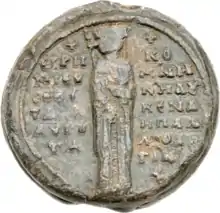| Irene of Montferrat | |
|---|---|
 Seal of Irene of Montferrat | |
| Byzantine Empress consort | |
| Tenure | 1284–1317 (with Rita of Armenia, 1294–1317) |
| Born | Yolande of Montferrat c. 1274 Casale (modern-day Italy) |
| Died | 1317 (aged 42–43) Constantinople (modern-day Istanbul, Turkey) |
| Spouse | Andronikos II Palaiologos |
| Issue | |
| House | Aleramici |
| Father | William VII, Marquis of Montferrat |
| Mother | Beatrice of Castile |
Yolande of Montferrat (c. 1274 – 1317 in Constantinople) (also known as Violante, then Empress Irene) was the second wife of Andronikos II Palaiologos and thus Empress of the Byzantine Empire. She was the heiress of the Margraviate of Montferrat.
Life
Born in Casale, she was the daughter of William VII, Marquess of Montferrat and his second wife Beatrice of Castile.[1] Her maternal grandparents were King Alfonso X of Castile[1] and his wife Violante of Aragon. Yolande (a variation of Violante) was named after her grandmother.
Empress
In 1284, Andronikos II, a widower by his first marriage with Anna of Hungary, married Yolanda (who was renamed Eirene as Empress). She and Andronikos II were distant cousins, both being descendants of Andronikos Doukas Angelos (ca. 1122–1185). With her, Eirene brought the Montferrat rights to the kingdom of Thessalonica,[1] a dominion that, despite having been conquered half-a-century before Eirene's birth by the Byzantine state of Epirus, was still claimed by its short-lived (1204–1224) Montferrat royal dynasty.
It was later proven that the Italian Montferrat had no living male heirs of the Aleramici dynasty, and Eirene's sons were entitled to inherit it upon the 1305 death of Eirene's brother John I, Marquess of Montferrat.
Later life
Eirene's stepson, Michael IX Palaiologos was intended to succeed her husband as emperor, but ultimately it was Michael's son Andronikos III Palaiologos, who became the successor instead of Michael. This was largely due to the work Eirene did to ensure some power and property to her own offspring.
Eirene left Constantinople in 1303 and settled in Thessalonica. She set up her own court in the city and controlled her own finances and foreign policy until her death fourteen years later. Nicephorus Gregoras portrayed her as an ambitious and arrogant leader in his historical writings.
Issue
- John Palaiologos (c. 1286–1308), despotēs.[1]
- Bartholomaios Palaiologos (born 1289), died young.
- Theodore I, Marquis of Montferrat (1291–1338).[1]
- Simonis Palaiologina (1294–after 1336),[1] who married King Stefan Milutin of Serbia.
- Theodora Palaiologina (born 1295), died young.
- Demetrios Palaiologos (1297–1343), despotēs.[1] Father of Irene Palaiologina.
- Isaakios Palaiologos (born 1299), died young.
References
- 1 2 3 4 5 6 7 Nicol, Donald M. (1994). The Byzantine Lady: Ten Portraits, 1250–1500. Cambridge and New York: Cambridge University Press. pp. 48–49. ISBN 0-521-45531-6.
External links
- Marek, Miroslav. "A pedigree of the Montferrat family". Genealogy.EU.